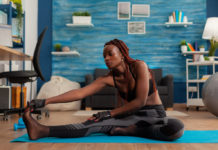At Citizen Ed and brightbeam we talk a lot about the digital divide, a major obstacle to equitably delivering home instruction during this pandemic. New Jersey is no exception, with 230,000 schoolchildren lacking either laptop and/or internet. This week the divide got close-up and personal for me when I had the opportunity to speak to Jacqueline Vargas, a student herself and the mother of two children, ages 13 and 8. She and her children live in Apostles’ House, which Shennell McCloud of Project Ready describes in an op-ed as “an inspiration, providing women with a place where they and their children can live safely while they get back on their feet and start a new life.” There are 60 children pre-k-12 who live in the three buildings run by Apostles’ House. Across Newark there are 160 displaced students who live in shelters and motels.
Here is an edited version of my conversation with Ms. Vargas.
Jackie, tell me a little bit about yourself and your kids.
I’ve been here at Apostles’ House since October with my children, who are 13 and 8. I love it here, although I’m starting to look for an apartment. I was laid off from my job at Prudential Center because of the pandemic but I have a new job as a phlebotomist. Anyway, my kids were doing just fine at Camden Street School [a Newark Public Schools District K-8 school] –Giovanni is a whiz in language and Isabella is a whiz in math! But when they sent everyone home because of coronavirus in March, we were stuck.
How do you mean?
Each Apostles’ House has only one mobile hotspot and one modem. This digital learning was such a headache, with the wifi going in and out. There were days when we couldn’t connect at all. I’m in a pre-nursing program at Essex Community College and in the spring I was taking a prep course for the TEAS, a test you have to pass to get into nursing school, plus one of my other three courses was AP Anatomy and Physiology II. One day I had a research paper due and a class but the wifi didn’t work. It was pouring rain but I sat outside on a bench where I could connect to the internet, clutching an umbrella over my laptop trying to take notes and listen to a three-hour Zoom class.
That sounds awful!
It was. Even worse, my kids were missing classes too.
But you had a laptop.
Yes, I had my own, an old HP. When my kids were in school they had laptops too. But they couldn’t bring them home once school closed down. So we had one laptop among the three of us.
Couldn’t you get Chromebooks from the district?
I didn’t even find out about that option until Miss Suzane [Suzane Thomas, the organization’s director of Transitional Housing] told me. I had never heard from the district, not even an email, a phone call, a text message. I was really taken aback by the lack of communication. So I started calling the principal, the central office—I was in a panic!—but everything was shut down. Finally I reached someone and they said I was too late, that they were out of Chromebooks. When NPS started Zoom classes, it was so hard to navigate among us three. I called one of my children’s teachers and she said she’d reach out and get us one Chromebook.
The wifi was a whole other issue. Miss Suzane kept trying to call Verizon and someone would come out and then they’d leave and the internet would go down again. Or they couldn’t come because of Covid. Even today the wifi is in and out.
But you had a stroke of luck when Shennell came by!
I did! Project Ready came to Apostles’ House—it was such a beautiful thing. Miss Shennell blessed us with two Chromebooks and two Wifi portable boxes. It is such a blessing because Giovanni has started at his new school already and I’ve been doing research on apartments.
Yet during this past school year you must have struggled to keep your kids learning. How did you manage?
I don’t even know to this day. I reached out to all of their teachers: my daughter had one teacher for social studies and science, another teacher for language and another for math. My son had one teacher for math, social studies, and science and another for language. Their teachers were amazing in reaching back out, on top of every question I had. It was hard to navigate all these different tools and platforms, though. I set up a schedule for both my children: the times they needed to hand in homework, the times they had to sit for classes. My daughter is still so young, not very computer-savvy, and it was hard for her to maintain her attention. If I left her alone, the teacher would say, “write five paragraphs on this or that” and that’s too challenging for her. Giovanni actually thrived. He was not a good student but with my supervision he started getting such high grades!
Also, Apostles’ House has a “Homework Help” program so other parents and I could ask for guidance.
Looking back, what do you think of the way NPS handled the sudden shift to remote instruction?
Newark should have done more to reach out. If I wasn’t a parent who was so involved, it would have gone badly. I’m a humble person, just a mom, but I’m focused on their academic success. I don’t understand how they could tell me there were no more Chromebooks given our situation. If Miss Shennell hadn’t come by, my kids would have fallen so far behind. I think the district higher-ups need to reach out and build better interpersonal relationships with families.
Do you feel set for the new school year?
I think we’ll do alright. I had planned to take the TEAS [the nursing exam] this summer but I had to delay it a year because I couldn’t keep up with the prep class without wifi. This took my hope away. It was why I didn’t sign up for summer classes–why bother if I don’t have wifi? But thanks to Miss Shennell, I have both wifi and my hope back.
Make sure to tune into “Access Denied” every Friday at noon Eastern to keep up with the ongoing fight to keep all students learning during this unprecedented time.









